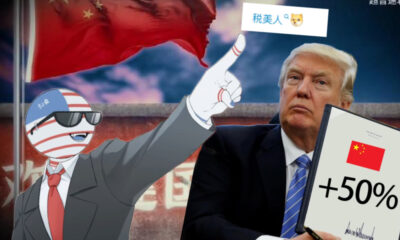Featured
Two Sides of the Olympic Medal: Eileen Gu’s Gold and Beverly Zhu’s Fall on Weibo
Eileen Gu and Beverly Zhu seem similar in many ways, but their Olympic journey in China turned out so differently.
Published
3 years agoon

This week, Chinese social media saw two sides of the Olympic coin. Eileen Gu and Beverly Zhu are both American-born teenagers competing for China in the Olympics, but while Gu was celebrated, Zhu was condemned.
A day after grabbing gold at the Olympics, the 18-year-old Chinese American freestyle skier Gu Ailing (谷爱凌 Eileen Gu) is front-page news in China. She is China’s biggest Olympic social media hit since female swimmer Fu Yuanhui became an online sensation during the Summer Olympics in Rio.
Eileen Gu’s gold medal at the women’s Freeski Big Air final was the third gold medal for China and Gu also became China’s first female gold medalist in snow sports.
Gu is popular for her athletic talent and disarming smile, but the American-born teenager also garnered huge attention online for switching national affiliations and competing for China, a decision she announced in June of 2019. At the time, Gu called the decision “incredibly tough,” writing:
“I am extremely thankful for U.S. Ski & Snowboard and the Chinese Ski Association for having the vision and belief in me to make my dreams come true. I am proud of my heritage and equally proud of my American upbringing. The opportunity to help inspire millions of young people where my mum was born, during the 2022 Beijing Winter Games is a once-in-a-lifetime opportunity to help to promote the sport I love. Through skiing, I hope to unite people, promote common understanding, create communication, and forge friendships between nations.”
Now, 2.5 years later, Gu has not just won gold, she has also won the hearts of millions of netizens who call her the “snow princess” – the hashtag “Gu Ailing’s Gold Medal” (谷爱凌金牌) received over two billion views on Weibo and the platform’s servers even temporarily went down after Gu’s win (this, by the way, also once happened back in 2017 when Chinese singer and actor Lu Han announced his new relationship).
Gu: An Online Sensation and Rolemodel for Girls
This week, Gu is all over Chinese social media, with videos and images of her epic win dominating feeds on Weibo and Douyin and an advertisement for Chinese sports brand Anta featuring the medalist popping up everywhere. Chinese super celebrities such as Roy Wang (TFBoys) are drawing even more attention to Gu by publicly congratulating her – Wang’s message to Gu received some 400,000 likes on Tuesday.
On February 8, 520 drones formed a portrait of Gu in the city of Sanya to celebrate her gold medal. A video and images of the moment went viral (#三亚520架无人机庆谷爱凌夺金#).

But there is much more. There’s Gu wearing a panda hat, Gu eating dumplings, Gu saying she’s never been to Hainan (#谷爱凌说自己没有去过海南#), Gu talking about how she handles fear (#谷爱凌谈如何应对恐惧#), and then there’s the viral video of her cooking together with her Chinese grandmother (#谷爱凌姥姥冯工#); almost anything Gu does or says nowadays seems to go viral.

It should be noted that the Olympic athlete was already popular before she snatched the gold medal. According to Chinese domestic consumer research platform CBNData, Gu promoted at least twenty brands and companies in 2021 alone, including Anta Sportswear, Midea, Luckin Coffee, China Mobile and Bank of China. Based on the information regarding Gu’s brand endorsement fees, CBNData estimates the teenager must have made at least 200 million yuan ($31,4 million) over the past year for doing work related to promotions and brand ambassadorship.

Gu Ailing promoted at least twenty different brands in 2021.
For many, Gu is an inspiration. The young athlete is hard-working and smart – she was admitted to Stanford – and she is not afraid to speak her mind when reporters ask her tricky questions.
“Gu Ailing’s positivity gives me strength,” one female Weibo user writes:
“She’s dealing with an American upbringing, Chinese ethnic identity, being a girl in extreme sports, public opinions about her nationality, all kinds of people speaking for her, yet she is always outgoing and steady. Really, it doesn’t matter what happens, what matters is what makes you happy. Are you happy in your life? Don’t dwell on loss and regret, ok?”
Debates about Gu’s citizenship have played out across international social media over the past few weeks. Since China does not recognize dual nationality, the general assumption is that athletes like Gu who compete under its banner are required to renounce their non-Chinese citizenship, but reporters’ questions regarding Gu’s current citizenship were recurrently avoided, leading to more speculation on whether or not she actually gave up her American passport or not.
On Chinese social media, many thought these discussions were irrelevant, stressing that Gu represented China for the Olympics now and that the issue of her citizenship was only brought up to polarize.
One Weibo user (@远望白洞) wrote:
“The people who care too much about what nationality she is only want to criticize her for 1) potentially someday returning to US citizenship and 2) using dual citizenship to get special treatment. Either way, I don’t think there’s anything wrong with it. It’s her freedom to go back to the US and the positive effect she has on so many young people will not disappear because of it.”

Eileen Gu and her mother, image published by Sohu.com.
That Gu is praised as an example and role model for women also relates to her background. Gu was raised by her Chinese mother, a molecular biology graduate and former ski instructor, and her maternal grandmother, a former official at China’s Ministry of Transport. Not much is known about who her (American) father is, and it seems clear that the upbringing by these two powerful women has contributed to Gu’s determination and drive, and her own ambition to inspire other girls and young women.
Beverly Zhu: Olympic Cyber Bullying
Just some 48 hours before Gu’s Olympic success, there was the Olympic debut of another US-born athlete representing China. Like Gu, Beverly Zhu is a California-born teenager who changed her citizenship to compete for China during the Winter Olympics. Her parents, both Chinese, moved to the US in the 1990s.

The 19-year-old figure skater announced she would be representing China in September of 2018 and changed her name to Zhu Yi (朱易).
Zhu already was not as popular as Gu on Chinese social media before the Olympics. Her Weibo account has some 110,000 fans, while Gu now has over 4,2 million fans on her personal Weibo page.

But the contrast with her fellow California-born Olympic colleague became even starker when Zhu’s Olympic debut turned out to be somewhat of a disappointment. The athlete ended with the lowest score after she crashed into a wall and failed to correctly land two jumps in the women’s singles short program on Sunday, pushing Team China out of the medals – she was almost unable to hold back her tears.
Afterward, she told reporters:
“I guess I felt a lot of pressure because I know everybody in China was pretty surprised with the selection for ladies’ singles, and I just really wanted to show them what I was able to do, but unfortunately I didn’t.”
Zhu then fell twice in the free skate on Monday, after which she openly sobbed.
During the week, Zhu was criticized and even ridiculed on Chinese social media. There was the Weibo hashtag “Zhu Yi Cries Again in the Arena” (#朱易再度泪洒冰场#), “Zhu Yi Cries” (#朱易哭了#), and “Zhu Yi Fell” (#朱易摔了#), which was later taken offline by online censors along with some ninety Weibo accounts and hundreds of messages bullying Zhu.
But even after the meanest comments were taken offline, Weibo users still expressed their apparent dislike for Zhu. “If you can’t handle the pressure, what are you doing here?”, some said, with others writing: “What is she crying about? It should be us crying while watching her.”
Zhu is by no means the first Chinese female Olympic athlete to experience cyberbullying. During the Tokyo Olympics, athletes Wang Luyao and Yang Qian were also attacked by netizens, showing just how quickly public sentiment can turn against those who are in the limelight.
Did Zhu receive so much criticism just because of her performance, or is there more behind it? For both Zhu and Gu, the fact that they represented China as American-born teenagers automatically meant more eyes were focused on them already.
While Gu seems carefree in talking to the media, Zhu appears more timid and soft-spoken. This might have contributed to Zhu being not as popular online, especially after Zhu cried after her disappointing performance. When Chinese swimmer Fu Yuanhui (傅园慧) became an overnight online sensation during Rio, it was not her bronze medal that made her popular but her enthusiasm and confidence.
Another reason which perhaps prevented Zhu from becoming more of an idol among the public is the fact that there have been many rumors about how Zhu allegedly did “not deserve” her Olympic spot and those regarding her father’s role. Zhu’s father is a renowned Chinese professor who, along with his daughter’s move, also came back to work at prestigious universities in Beijing. It was rumored that Zhu’s father might have helped his daughter get a spot on the Olympic team. Although the rumor was later later refuted, many people were already prejudiced about the young figure skater.
It’s worth noting that there are also hundreds of Weibo users jumping to Zhu’s defense and those condemning the cyberbullying surrounding her. Just like Gu, she sacrificed a lot and worked very hard to get where she is today, even if it did not lead to her grabbing a medal.
There are also those netizens who remind others that Zhu is just a teenager, as is Gu. Some are already worried about Gu’s sudden rise to fame, too. One netizen (@哭泣的空肚子) wrote:
“Fame is a double-edged sword. Your success can be magnified to an extreme, and your mistakes can also be enlarged without boundaries. From now on, she will face the days in which she’ll be carefully walking on the sharp edge of that sword because if she does something that does not conform to what people expect of her, the same people who praise you today will then step on you.”
Perhaps, it is not Zhu Yi but Eileen Gu who will be walking on eggshells for the time to come.
Read more about China and the Olympics here.
By Manya Koetse
With contributions by Miranda Barnes.
Spotted a mistake or want to add something? Please let us know in comments below or email us. First-time commenters, please be patient – we will have to manually approve your comment before it appears.
©2022 Whatsonweibo. All rights reserved. Do not reproduce our content without permission – you can contact us at info@whatsonweibo.com.
Manya is the founder and editor-in-chief of What's on Weibo, offering independent analysis of social trends, online media, and digital culture in China for over a decade. Subscribe to gain access to content, including the Weibo Watch newsletter, which provides deeper insights into the China trends that matter. More about Manya at manyakoetse.com or follow on X.

Chinese Language
Chinese New Nickname for Trump Mixes Fairy Tales with Tariff War
From Comrade Trump to the Tariff Beauty, Trump has many nicknames on Chinese social media.
Published
2 days agoon
April 16, 2025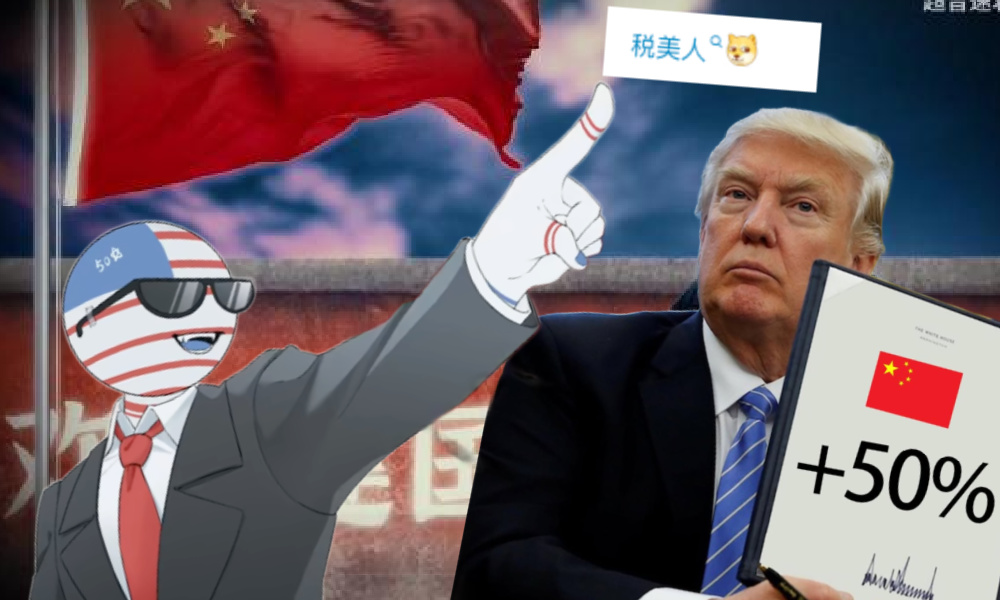
As the tariff turmoil between the US and China continues, President Trump has earned himself a new nickname on Chinese social media.
Over the years, Chinese netizens have come up with many different nicknames for the American President, whose Chinese name is usually transliterated as 川普 Chuānpǔ for phonetic reasons (read more here: Why Trump Has Two Different Names in Chinese).
But Chinese netizens call Trump many other things than just Chuānpǔ. You might have come across nicknames like “Comrade Build the Country” or “Build-the-Country Trump.”
Trump as China’s “Comrade Build-the-Nation”
“Build-the-Country Trump” or “Trump the Nation-Builder” (川建国 Chuān Jiànguó) has been an online joke on Chinese social media for years, often used alongside the related nickname “Comrade Build-the-Nation” (建国同志 Jiànguó Tóngzhì).
The joke began circulating in the early days of Trump’s first presidency in 2017, though even earlier there were humorous memes and satirical stories claiming Trump wasn’t truly American at all — the story goes that he was born in Zigong, Sichuan Province (四川自贡) in China.
When it was confirmed that Trump had won the presidency, proud Sichuan locals joked that he was one of their own, claiming that his Chinese name Chuānpǔ paid homage to their province, as it contained the “Chuan” from “Sichuan” (which literally means “river”). From this, an entire fabricated yet fascinating story about Trump’s Chinese roots emerged.
According to these stories circulating since late 2016, Trump’s father Fred Trump (referred to as Old Trump 老川普) was a businessman who came to China during World War II and stayed until 1947, a year after Donald’s supposed birth. This version of events claims that Old Trump lived through both the Anti-Japanese War and the Chinese Civil War while in China.
The story further claims that the Trump family lived on Guangda Street in Zigong’s Guojia’ao neighborhood (光大街郭家坳), now the site of the Salt Industry Drilling Team’s club. Trump was said to have been born there before leaving China. Zigong is known for its high-quality, expensive salt, and according to the tale, Old Trump shipped this salt to northern China or back to the US, earning a fortune that laid the foundation for the Trump family’s future wealth — and Trump’s eventual rise to the White House.
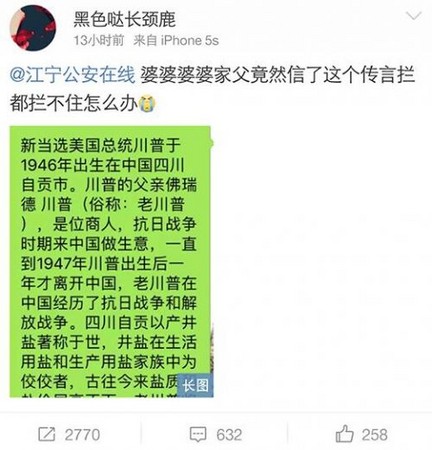
Old screenshot from a Weibo user who found it funny to discover the father-in-law actually believed the fabricated story about Trump being from Sichuan.
What does this entire online fairy tale have to do with Trump’s old nicknames? When Trump was in power, it soon appeared that he was doing all kinds of things that raised eyebrows. He once said that Korea used to be part of China, and then made a series of moves — like withdrawing from the Trans-Pacific Partnership, pulling out of the Paris Climate Accords, and announcing that the US would leave UNESCO — which Chinese netizens saw as a weakening of US global influence, and therefore indirectly as a boost to China’s rising power. The trade war and Trump’s tough stance on Chinese tech companies were also, in a way, seen as forcing China into tech self-reliance, further accelerating the country’s domestic innovation.
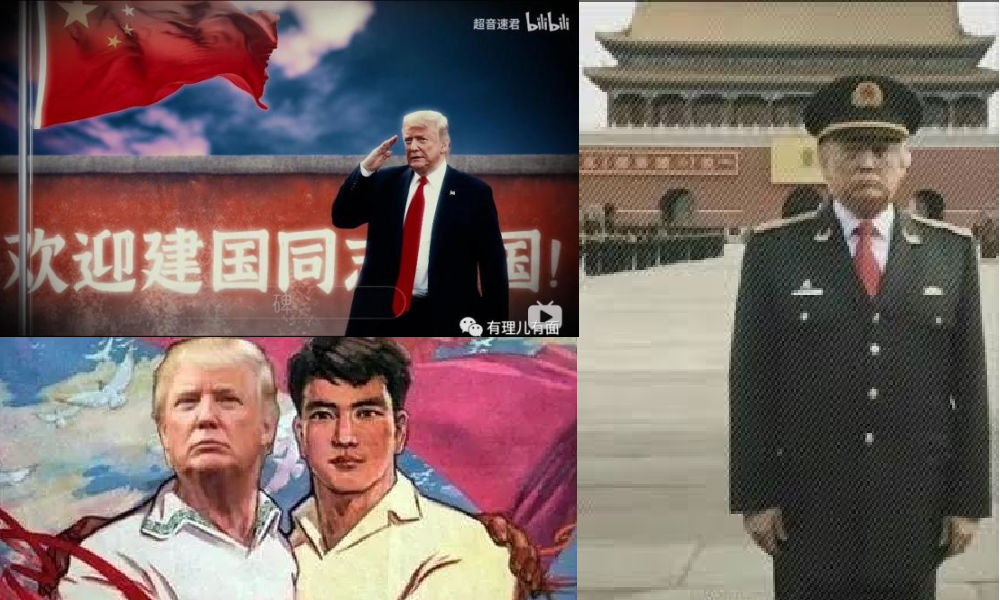
Comrade Trump memes.
All of this combined earned Trump the nickname “Comrade Build-the-Nation,” jokingly fuelling the idea that he was actually China’s ‘secret agent’ on a mission to undermine American imperialism and support China’s rise on the world stage.
Trump the “Tariff Beauty”
Trump’s latest nickname incorporates some of the same sentiments that led to him being jokingly called a “comrade” of China.
Amid ongoing tariff tensions, some Chinese netizens,including some creators of meme-style ‘nation personification’ videos (鬼畜动画) on Douyin and Bilibili, as well as some commenters on Weibo and Xiaohongshu, have started referring to Trump as “税美人” (shuìměirén), which literally means “Tariff Beauty.”

Meme-style videos on Bilibili and Douyin titled “Shuimeiren.”
The nickname is a clever pun, since it sounds exactly the same as the Chinese name for the Sleeping Beauty fairytale: 睡美人 (shuìměirén) (there is also a South Korean 2016 movie of the same name 税美人, Tax Beauty).
What makes the nickname extra catchy is the wordplay: “税” (shuì) means “tax” or “tariff,” and “美” is also an abbreviation for America (from Měiguó, 美国). So, “税美人” not only brings to mind a fairytale princess, but also evokes the idea of “the American who taxes,” perfectly capturing Trump’s dramatic tariff policies in a playful way.
The nickname was especially used in comment sections when Trump began threatening additional tariffs, eventually bringing the total tariffs on Chinese goods to 145% on April 10.
Meanwhile, the “Comrade Trump” meme is more relevant than ever. Both China’s official and unofficial reactions to Trump’s tariffs reflect a general belief that the policies will ultimately harm the American economy and its global influence, while boosting China’s domestic market (also read our latest here).
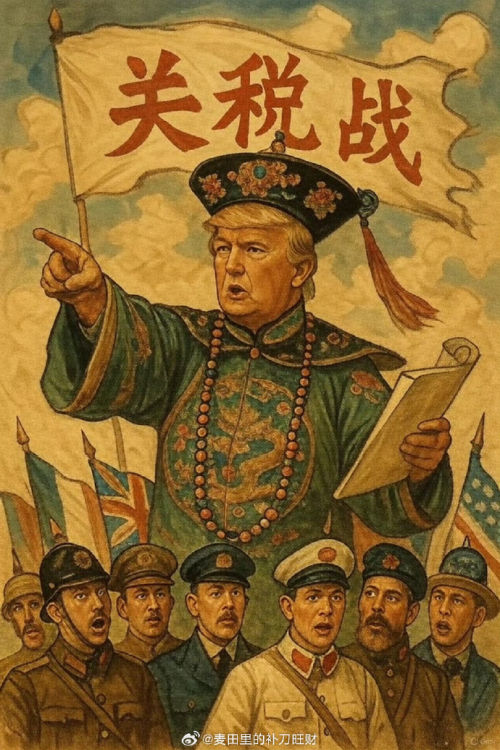
Trump the Tariff Beauty, on Weibo.
On April 16, Harvard University Assistant Professor Moira Weigel published a commentary titled “Long Live Comrade Trump’s Tariffs” in The New York Times, which was later elaborately discussed by Chinese media outlet Guancha.
The article opens by briefly referencing China’s “Comrade Build-the-Nation” meme. Weigel argues that there’s some truth to the sentiment behind the nickname, suggesting that Trump’s tariffs won’t bring manufacturing back to the US, but will instead strengthen China’s position in global e-commerce. She notes that Americans will simply end up paying more for the same goods they’ve always bought, while Chinese companies are accelerating innovation, expanding internationally, and finding clever ways to circumvent tariffs by working with third-party companies and establishing US-based warehousing.
There’s perhaps also another layer to Trump’s new nickname — it also suggests that he is asleep, and, meanwhile, like the “Comrade” meme, is actually hurting the US and strengthening China. One netizen suggested that when it momentarily seemed Trump was backing down by exempting electronic goods from the tariff, a handsome prince had given him a kiss that made him wake up.
But with Trump later declaring that there was no “exception” at all, it seems that the confusion — as well as tariff tensions — are only growing. For now, there’s no happy ending in sight.
By Manya Koetse
(follow on X, LinkedIn, or Instagram)
PART OF WHAT’S ON WEIBO CHAPTER: “THE US-CHINA TARIFF WAR ON CHINESE SOCIAL MEDIA“
Spotted a mistake or want to add something? Please let us know in comments below or email us. First-time commenters, please be patient – we will have to manually approve your comment before it appears.
©2025 Whatsonweibo. All rights reserved. Do not reproduce our content without permission – you can contact us at info@whatsonweibo.com.
Featured
China Trending Week 15/16: Gu Ming Viral Collab, Maozi & Meigui Fallout, Datong Post-Engagement Rape Case
Published
3 days agoon
April 15, 2025
Here’s a roundup of curated top trends and noteworthy discussions on Chinese social media this week. But I’m still scrolling — this page updates with throughout the week, so check back & refresh for the latest.
🔄 Last updated: April 18
For insights into the escalating US-China trade war, check our week 15 article here.

Chinese Tea Brand Gu Ming Goes Viral for Collab with Honkai: Star Rail Game
Since 2023, the power of creative collabs has become crystal clear: younger Chinese consumers especially love it when tea or coffee chains team up with unexpected partners, like Luckin and Maotai, or the controversial LeLeCha and Lu Xun and HeyTea with the Jingdezhen Ceramics Museum.
In the latest successful collabs, you see more ACG (Animation, Comics, and Games) mixing it up with China’s homegrown coffee and tea franchises, like the collab between HeyTea and Hello Kitty, which became a big hit in late 2024.
On April 18, Chinese tea brand Gu Ming (古茗, also known as ‘Good Me’) launched its new collaboration campaign with the Chinese anime-style game Honkai: Star Rail (崩坏:星穹铁道), featuring a range of collectible tea cups, bags, and other accessories.
The collab immediately shot to the top of Weibo’s trending list, and online queues went wild — with over 1.2 million people reportedly waiting in virtual lines to place an order. Some video showed employees getting overwhelmed with all the orders coming in. The surge led to widespread frustration over app crashes and users being logged out mid-process. By Friday, everything had sold out, and fans were already preparing for the next round of lining up.
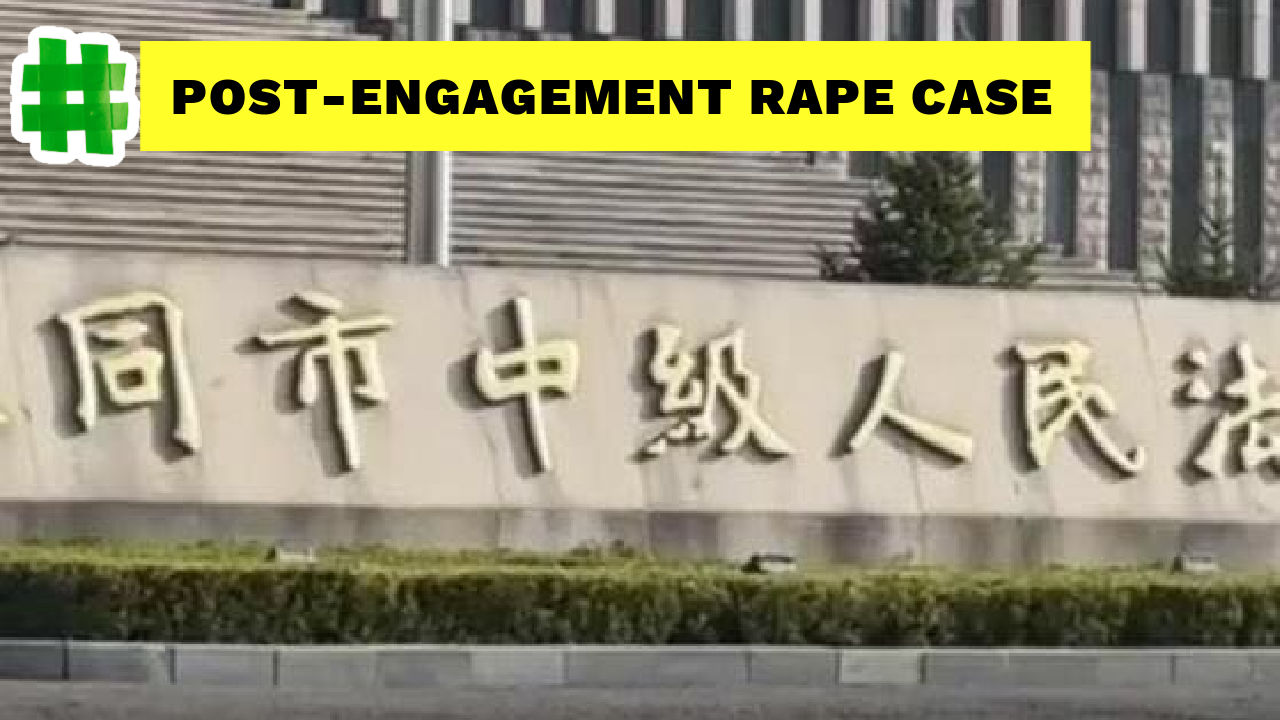
🏛️ Verdict in Second Trial of Much-Discussed Post-Engagement Rape Case
An older story has gone viral again this week, following the verdict in a second high-profile trial in the so-called “Engagement Rape Case” (订婚强奸案). In May 2023, a young couple from Datong, Shanxi, held their engagement ceremony—they had met two months earlier through a matchmaking service. Along with an expensive engagement ring, the man’s family also paid a bride price of 100,000 yuan ($13,600). However, after the engagement party, the groom-to-be forced himself on the bride-to-be at his apartment, despite her resistance. She panicked, set fire to his curtains, attempted to flee, and eventually called the police.
In December 2023, the man was convicted of rape and sentenced to three years in prison. He appealed the ruling, but in the second trial verdict announced this week, the Datong court rejected Xi’s appeal, upheld the original conviction, and confirmed the sentence. The man continues to deny any wrongdoing.
This case has become significant because it touches on so many layers: sexual consent, bride price customs, traditional gender norms, sexual violence, and online doxxing. Among the more debated details is the misunderstanding surrounding the victim’s medical report, which showed her hymen was intact—leading some to mistakenly believe this meant rape was impossible. In reality, as confirmed by medical research, hymen status is not an accurate or reliable indicator of prior sexual activity or assault (source). Another controversial element is the role of the perpetrator’s mother, who exposed the victim’s private information online, further inflaming public debate.
Discussions around the case remain heated. While some netizens express concern that the verdict may contribute to growing distrust between men and women—arguing that men may now feel vulnerable if they cannot prove sexual consent with their own fiance or wife (and even suggesting they should make up sexual consent contracts now) —many others voice strong support for the victim, believing that the man should have received an even heavier sentence.

💔 Domestic Violence Allegations: Russian-Chinese Couple’s Relationship Into the Spotlight
The relationship between the influencer couple of the Russian ‘Maozi’ (毛子) and Chinese ‘Meigui’ (玫瑰) has become a trending topic of debate these days due to rumors of domestic violence. The couple have been running a popular daily life family vlogging account (毛子一家生活点滴). On Douyin, they have over two million fans, on Weibo, more than 2.7 million. Central to their vlogs is their young son Chuanchuan. On April 15, Meigui virtually dropped a bombshell by exposing how she’s a victim of domestic abuse, writing:
“You were really good to me. So good, that I became your possession. The psychological manipulation was endless. I couldn’t have friends, needed your permission to go anywhere, and if I disobeyed, you’d hit me (it only started this year and grew more intense). I used to romanticize pain, thinking it was your way of showing me love. I’d laugh at your jokes and never held grudges. But when my life was threatened, I couldn’t just sit back and ignore it anymore.”
Now that Meigui has come forward on Weibo to share screenshots and videos suggesting she is being abused and scolded by her husband, even in the presence of their son, netizens are worried about her but also about the young boy and how his parents’ abusive relationship is affecting him, leading to the hashtag “Poor Chuanchuan” (#心疼川川#) momentarily becoming top trending on April 15. Meanwhile, ‘Maozi’ also created an account on Weibo, where he denied ever hitting his wife. “Zero tolerance for domestic abuse,” one commenter wrote. “I support Meigui and hope she gets a divorce soon.”
By Manya Koetse
(follow on X, LinkedIn, or Instagram)
Spotted a mistake or want to add something? Please let us know in comments below or email us. First-time commenters, please be patient – we will have to manually approve your comment before it appears.
©2025 Whatsonweibo. All rights reserved. Do not reproduce our content without permission – you can contact us at info@whatsonweibo.com.
Subscribe

Chinese New Nickname for Trump Mixes Fairy Tales with Tariff War

China Trending Week 15/16: Gu Ming Viral Collab, Maozi & Meigui Fallout, Datong Post-Engagement Rape Case

China Reacts: 3 Trending Hashtags Shaping the Tariff War Narrative

No Quiet Qingming: From High-Tech Tomb-Sweeping to IShowSpeed & the Seven China Streams

From Trade Crisis to Patriotic Push: Chinese Online Reactions to Trump’s Tariffs

“Dear Li Hua”: The TikTok/Xiaohongshu Honeymoon Explained

Beyond the Box Office: What’s Behind Ne Zha 2’s Success?

15 Years of Weibo: The Evolution of China’s Social Media Giant

Tuning Into the Year of the Snake

IShowSpeed in China: Streaming China’s Stories Well

TikTok Refugees, Xiaohongshu, and the Letters from Li Hua

The ‘China-chic Girl’ Image and the Realities of China’s Competitive Food Delivery Market

US-Russia Rapprochement and “Saint Zelensky”: Chinese Online Reactions to Trump’s Shake-Up

“Black Myth: Wukong”: From Gaming Screens to the CMG Spring Festival Gala?

How Ne Zha 2’s Shen Gongbao Became Known as the Ultimate “Small-Town Swot”
Get in touch
Would you like to become a contributor, or do you have any tips or suggestions? Get in touch here!
Popular Reads
-

 China Insight11 months ago
China Insight11 months agoThe Tragic Story of “Fat Cat”: How a Chinese Gamer’s Suicide Went Viral
-

 China Digital11 months ago
China Digital11 months agoChina’s 2024 Gaokao Triggers Online Discussions on AI
-

 China Arts & Entertainment11 months ago
China Arts & Entertainment11 months agoSinging Competition or Patriotic Fight? Hunan TV’s ‘Singer 2024’ Stirs Nationalistic Sentiments
-

 China Brands, Marketing & Consumers12 months ago
China Brands, Marketing & Consumers12 months agoZara Dress Goes Viral in China for Resemblance to Haidilao Apron

